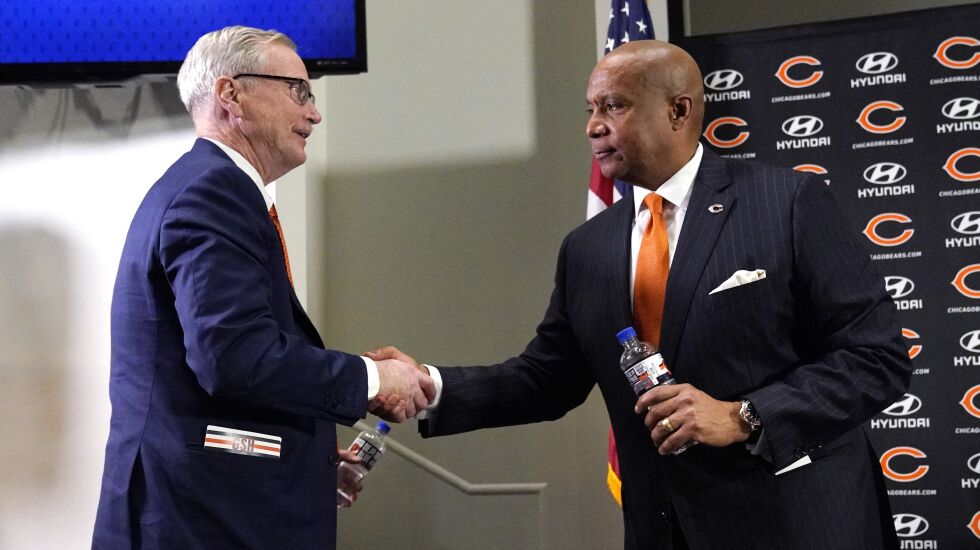
Before the 2019 season, the Bears held a celebration to mark the 100th season of the NFL. It was fitting for the charter franchise of the league to throw a giant party. During the celebration, chairman George McCaskey announced the team would be wearing throwback jerseys modeled after ones the team wore in 1936. There was only one problem: Those uniforms debuted during a period when the NFL was excluding Black players.
Chicago sports historian Jack Silverstein wrote an incredibly researched piece examining what role, if any, founder George Halas played in this era of segregation. At a time when the Bears wanted to celebrate their past, they were being haunted by it. It was a humiliating moment.
McCaskey took action, doing something that people in power often talk about but rarely do: actually listening to others. The Bears had a social justice committee of players work through the issue with McCaskey. The result was positive conversations where McCaskey did more listening than talking. Then the team produced a video with him addressing the dark time in team, family and league history.
“This Sunday against the Vikings, our players will wear the 1936 classic jersey,” McCaskey said. “That was from a time when, unfortunately, African Americans were not included on the Bears or other NFL rosters. Integration of the NFL and the Bears was too long in coming. But we’re proud that this year’s Bears will be the first African Americans to wear this jersey.”
I don’t know if this was a catalyst for change in the Bears organization overall, but it sure seems like it. McCaskey is privileged and quirky — two qualities that allow us to take jabs at him — but it seems clear that since then, he has been more open to looking at the experience of his players through a different lens. The Bears are better off because of it.
In the middle of the pandemic, when issues of social justice were becoming too big to ignore, McCaskey again sat down with players to learn from their experiences. Former linebacker Sam Acho and McCaskey had numerous conversations about the subject and put out a video explaining how the Bears would again take action.
Since then, we’ve heard McCaskey talk about the influence of people like Lamar Campbell, the Bears’ former vice president of player engagement, and Tanesha Wade, their senior vice president of diversity, equity and inclusion. I’ll admit I feared this was the Bears using high-ranking Black executives as a shield for failure, but McCaskey elevated their profiles during the process that led to the hiring of general manager Ryan Poles last winter. For a franchise that often operated like a mom and pop store, the Bears started to look less insular.
Now, three of the most powerful people at Halas Hall are Black. Quarterback Justin Fields has become a fan favorite and a symbol of hope. The football operation is run by Poles, who has been tasked with bringing the Bears back to glory. He’s armed with the most salary-cap space in the NFL and the No. 1 pick in the draft.
On Tuesday, the Bears introduced new president and CEO Kevin Warren. When news of Warren’s interest in the job leaked, it seemed like a perfect pairing. The résumé speaks for itself. He has NFL experience, including being the point person on the building of U.S. Bank Stadium in Minneapolis. Now that the Bears have their own parcel of land to build on, his experience will be invaluable. Couple that with the rights deal he brokered for the Big Ten and it’s hard to think of anyone more qualified to take over for Ted Phillips.
It’s quite the turnaround for McCaskey and the Bears. Three years ago, they were embarrassing themselves when it came to issues of race and inclusion. Now they’re one of the most progressive franchises in the league. That doesn’t happen without the powerful really examining their successes and failures. McCaskey deserves credit for that.
I don’t know if any of this is going to work, but I do know the Bears have become easier to root for. They are acting like a company worth billions of dollars should — finding the best people, no matter what. The change has been seismic. This isn’t your grandfather’s team anymore, and that’s a win for us all.
You can hear Laurence Holmes talk Chicago sports Monday to Friday from 10 a.m. to 2 p.m. on 670 The Score with Dan Bernstein.







